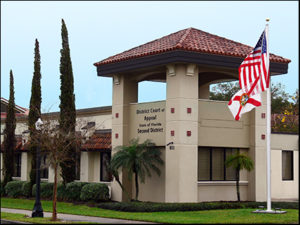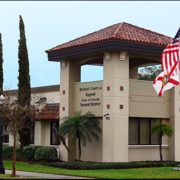
Jared Krukar introduces the judges of the court at the 2017 Practicing Before the Second DCA CLE presented by the Florida Bar Appellate Practice Section. Photo by Kristin Norse.
The Second District Court of Appeal has long been known for its liberality in granting oral argument, but also had a discrete list of types of cases in which it would almost never do so. However, the Court recently updated its Internal Operating Procedures[.pdf] (“IOPs”) to reduce the list of exceptions and leave the judges with more express discretion.
The prior Internal Operating Procedures expressly listed six types of cases where oral argument was “not generally permitted.”
The IOPs were last amended on October 15, 2015. In that version, the Court stated it would generally not permit oral argument in appeals in which a pro se party is incarcerated, reemployment assistance appeals, original proceedings, postconviction appeals, 9.130 final and nonfinal appeals, and motions.
The Court always had discretion to grant oral argument in any of these cases, but rarely deviated from the list.
The new Internal Operating Procedures reduce the exceptions, but expand apparent discretion.
The revised IOPs, effective as of April 12, 2018, no longer expressly exclude from oral argument original proceedings, final and nonfinal 9.130 appeals, nonsummary postconviction appeals where the parties are represented, reemployment assistance appeals, or motions.
However, the IOPs added new language that elucidates the Court will likely apply discretion on a case-by-case basis more than it has in the past:
Requests for oral argument in expedited proceedings, including termination of parental rights and dependency cases, are presented first to the merits panel. Upon the panel’s decision to grant oral argument, the clerk will set the case on an expedited basis.
Other than expedited proceedings, cases are set for oral argument prior to the assigned panel’s review. As such, the cases are provisionally set for oral argument. Should the panel of assigned judges decide unanimously that the court will not benefit from oral argument, the clerk will be directed to notify the attorneys or parties by order that the argument is cancelled. An order cancelling argument for this reason will generally issue no later than two weeks before the date of the scheduled argument.
While the current IOPs still say that “the court permits oral argument as a matter of course in most proceedings,” this new language makes clear that the Court is aware of its discretion and will inevitably use it to reject oral argument when it deems fit to do so.
Does this mean more or less oral arguments in the Second District?
Well, according to the IOPs, it now appears that one can seek oral argument in nonfinal appeals, original proceedings, and certain other cases whereas before extraordinary measures would need to be taken.
But don’t jump the gun just yet. The Second District’s “Notice to Attorneys and Parties[.pdf]” still contains a list of types of cases excluded from oral argument, and it still matches what the old IOPs said.  Presumably the Second District will be updating the notice to match the new IOPs, but for now, it governs what parties can file. Also, check out our post on the Second District’s Practice Preferences as well to be sure you’re complying with all current requirements.
If you have a case on appeal and aren’t sure whether oral argument is available, or whether it is the best option for you, contact us and ask. There are pros and cons to every decision like this, and we can help you make the right choice for you and your case.
 The Portal is back for District Court of Appeal Filings! The Clerks first made the announcement in the Florida Bar News that all DCAs will be transitioning back to the Portal by January, with the Second and First Districts making the switch this month.
The Portal is back for District Court of Appeal Filings! The Clerks first made the announcement in the Florida Bar News that all DCAs will be transitioning back to the Portal by January, with the Second and First Districts making the switch this month.


